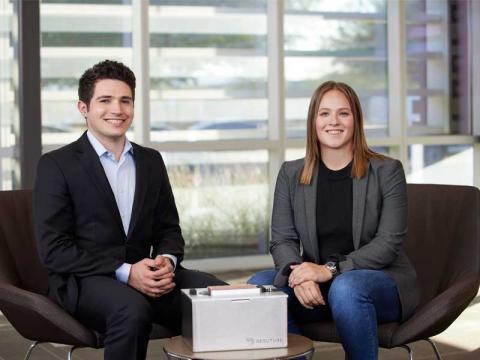Tulane graduates’ medical simulation startup receives prestigious NSF award
In 2019, then Tulane University seniors Hannah Eherenfeldt and Benjamin Knapp won the Novel Tech Challenge for their medical simulation startup, ReSuture. The company enables medical students and surgical residents to learn vascular surgical skills in a controlled and monitored environment.
Their victory came with a grand prize of $10,000, which they put towards a patent, further product development and equipment.
Less than two years later, the biomedical engineering graduates are celebrating another success. ReSuture, now based in Arizona, has won a highly selective National Science Foundation (NSF) Small Business Research (SBIR) award of $256,000.
The NSF SBIR program seeks innovative proposals that show promise of commercial and societal impact, with less than 15% of applicants receiving the grant. The pair will use the money for research and development related to their proposal Open Vascular Training System for Surgical Skill Acquisition and Evaluation.
“It’s an honor to receive a such a selective grant,” said Eherenfeldt, CEO of ReSuture. “The award is instrumental in allowing our company to realize our mission of improving surgical outcomes through advanced training. As young entrepreneurs, it’s so great to see that the NSF believes in what we are trying to accomplish.”
“We’ve got some incredible ideas in the works that will continue to transform surgical training,” said Knapp, the company’s chief operating officer. “This is key to bringing them to fruition, and I can’t wait to share what we have coming next.”
ReSuture won the award following a merit review process by experts in the field. The SBIR program is Congressionally mandated and intended to build a strong national economy by supporting scientific excellence and technological innovation through the investment of federal research funds in the private sector.
The grant will enable ReSuture to expand its capabilities and allow for the standardization of surgical education and evaluation. It is the latest in a string of successes for the fledgling company, which recently received an investment from the global venture capital firm SparkLabs, launched an initial set of vascular surgery training solutions and was accepted into the ASU-Mayo Clinic MedTech Accelerator. ReSuture products are also being used by the Tulane School of Medicine’s Simulation Center.
ReSuture’s innovate technology delivers highly accurate procedural experience outside the operating room, allowing surgeons to perfect necessary skills currently learned on the job. The company’s synthetic veins and arteries can be installed in a benchtop system that provides “blood” flow to replicate clinical scenarios. The incorporation of anatomical complexities such as plaque and thrombus makes it one of the most clinically accurate models on the market.
The Tulane Office of Technology Transfer and Intellectual Property Development, which sponsors the Novel Tech Challenge, worked closely with ReSuture in the company’s early development stages by providing mentors and advisors to guide the team through the licensing and patent process.
“Creating start-up companies like this is exactly why we started the Novel Tech Challenge,” said Shafin Khan, a licensing associate at Tulane. “Hannah and Ben have been very impressive as they pursued their project commercially after graduation, and this new award is proof of their effort.”
Eherenfeldt and Knapp are quick to credit their success to their biomedical engineering studies at Tulane and all the assistance they received through the Novel Tech Challenge.
"Tulane was pivotal in giving me the skills to succeed, both as an engineer and a founder,” Knapp said.
Eherenfeldt added, “Tulane gave me the opportunity to be exposed to a diverse set of experiences, which ultimately allowed me to develop the multitude of skills needed to start my business.

